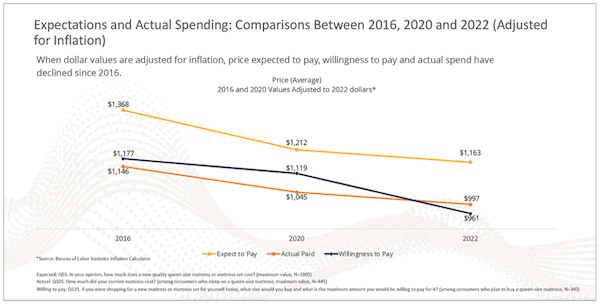New BSC research finds declines in amounts consumers are willing to pay, expect to pay and actually pay for queen mattress.

Consumers say they expect to pay $1,163 for a queen-size mattress or mattress set, but they are actually paying far less — $997 — for that mattress or set, according to new research conducted for the Better Sleep Council.
That $166 gap between expectations and actual expenditures in 2022 is nearly the same as the $167 gap between those categories two years earlier. But it is considerably less than the $222 gap between those categories back in 2016.
Inflation-adjusted figures show that the amounts consumers are willing to pay, expect to pay and actually pay for a quality queen-size mattress or set have declined steadily since 2016.
In 2016, consumers said they expected to pay $1,368 for a queen mattress or set, were willing to pay $1,177, and actually paid $1,146 for their current mattress.
In 2020, consumers said they expected to pay $1,212, were willing to pay $1,199, and actually paid $1,045 for their current mattress.
Just two years later, those numbers continued their decline, with consumers’ willingness to pay dropping to $961. But the 2022 numbers show that for the first time in the last six years consumers actually paid more than they said they would be willing to pay, an indication that consumers found more compelling mattresses in the market than they were expecting.
Mary Helen Rogers, vice president of marketing and communications for the International Sleep Products Association, says the declining expectations, willingness to pay and actual mattress spending also could be a result of an influx of value-priced mattresses from importers and online retailers, among other factors. The BSC is the consumer education arm for ISPA.
“Consumers now say they expect to pay, are willing to pay and are actually paying hundreds of dollars less than their expectations and spending practices in 2016,” she says. “In that time, the industry has seen a surge in low-priced mattress imports and the rise of retailers selling those mattresses and other value-priced models. While imports have moderated in recent years, many consumers have continued to shift their mattress price expectations downward.”
The turbulence in the economy sparked by the Covid-19 pandemic also could have depressed expectations about mattress prices and actual spending, she adds.
The new research also shows that age, income, education and location all influence the price consumers say they are willing to pay for a queen-size mattress or set.
Consumers are willing to pay more for mattresses as they grow older. Gen Z consumers (ages 18 to 24) are willing to pay $683, while millennials (ages 25-40) are willing to pay $891, Gen X (ages 41-55) are willing to pay $994 and boomers (ages 56-76) are willing to pay $1,074.
A similar pattern is evident with income levels. Consumers earning less than $30,000 a year are willing to pay $689 for a queen-size mattress or set, consumers earning $30,000 to $49,999 are willing to pay $952, consumers earning between $50,000 and $99,999 are willing to pay $1,122, and consumers earning $100,000 or more are willing to pay $1,071.
Consumers with less than a college education are willing to pay $844 for a queen-sized mattress or set, while consumers with college educations or higher are willing to pay $1,091.
And suburban consumers are willing to pay $1,046 for a queen mattress, while rural consumers are willing to pay $919. Urban consumers are willing to pay $861.
“This age, income, education and metro status data should be especially beneficial to bedding marketers looking to tap into consumer groups willing to spend significantly more for their mattresses than other groups,” Rogers notes.
The research also looks at consumers’ views on mattress values, finding that 47% of consumers say mattresses are too expensive for the value they provide, compared with 44% of consumers who feel mattresses are fairly priced for the value they provide.
That is a reversal of the situation as it stood two years ago, when 47% of consumers said they felt mattresses were fairly priced, and 41% of consumers felt they were too expensive for the value they provided.




